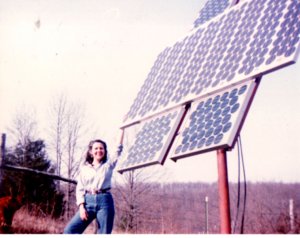Josiah
Senior Member
- Location
- 50 miles east of Cincinnati, OH
During an earlier chapter of my life my wife and I lived on a mountain in the Arkansas Ozarks miles from the grid. After living completely without electricity for a couple of years, I installed some solar panels (c. 1970's) And bought 12 second hand telephone company lead acid batteries. Each battery weighed 180 lbs. The solar panels were mounted on a cobbled together free standing mount that could be manually rotated so the panels would be directly facing the sun. Depending on the how low the battery reserves were we would reposition the panels every couple of hours to track the sun's movement. Mine was almost certainly the least high tech solar setup in existence. Still it did provide us with 12 volt DC electricity even after five sunless days in the winter and in 17 years of operation we never lost power once. The picture below shows the solar panel array with my wife adjusting the direction..



